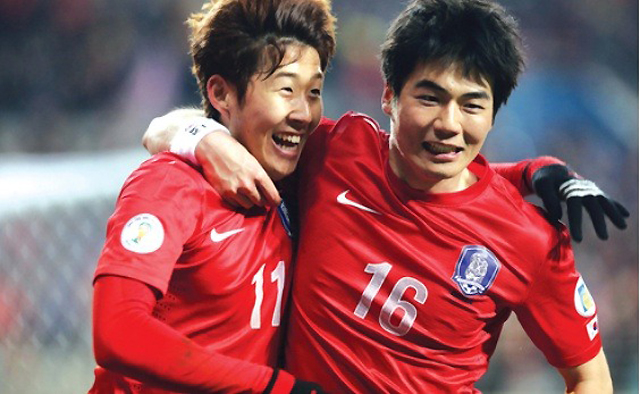by STEVE HAN | @steve_han
steve.han@msn.com
Last summer, fans threw a barrage of yeot candy at the Korean national soccer team players with a sign that read, “Korean soccer is dead!” when they returned home after failing to win a game at the World Cup for the first time in 16 years.
So much for pronouncing death. Only six months after the yeot-throwing incident, expectations for the Korean players ahead of the 2015 Asian Cup in Australia have been raised for the team to win a continental title for the first time in 55 years. Korea will play against Oman in its first match of the quadrennial tournament on Saturday, Jan. 10 at 4 p.m. PT.
The biggest question for South Korea is whether or not it can prove that its team has been reinvigorated by its newly-appointed German head coach, Uli Stielike, who replaced Hong Myung-bo after the World Cup.
Here are five things you might find interesting before the big tournament kicks off this weekend. You can view the full schedule of the month-long tournament here.
1. Son Heung-min has become the face of Korean soccer.
Son, who plays professionally for Germany’s Bayer Leverkusen, is arguably the most prolific goalscorer Korean soccer has seen outside of the legendary Cha Bum-keun from the 1980s. Still only 22, Son has played in Germany for seven years now, scoring over 10 goals in each of the past three seasons. He also speaks fluent German, which allows him to communicate freely with Stielike without an interpreter.
The trust Stielike has placed in Son is so profound that in light of South Korea’s top strikers’ injuries, the coach will likely opt for a strikerless formation to give Son more space in front of goal when he drifts from his usual left-winger position.
2. While Son is Korea’s most exciting player, Ki Sung-yueng may be the most important one.
A scorer up front, such as Son, could be a game-changer, but that’s only if the players behind him put in their best efforts to create winnable situations. The lynchpin of South Korea’s midfield is Ki Sung-yueng, who became one of English Premier League’s upper-echelon midfielders at Swansea City this season and earned the captain’s armband for his country just before the Asian Cup.
While the 25-year-old’s intricate passing has always been top notch, it’s his defensive intensity in midfield that has improved leaps and bounds this season. He is currently averaging 1.7 tackles and 2.5 interceptions per game for Swansea.
Ki’s most prized asset is his wide passing range, but he can also go for goals with thunderous long shots and can drop deep to play as an additional defender at the back.
3. The decline of former captain Koo Ja-cheol is a major concern.
Along with Son, Koo Ja-cheol is another South Korean star player based in Germany. However, the Asian Cup’s reigning scoring champion has been on a steady decline since he captained Korea’s under-23 national team to a dazzling bronze medal finish at the 2012 Summer Olympics.
The criticism has been that Koo as an attacking midfielder–a position that requires fast-thinking and well-timed passes–has formed a detrimental habit of holding on to the ball for too long before supplying it to his teammates. Koo’s pass completion rate this season at MSV Mainz of Germany is a disappointing 76.1%.
His struggle in Korea’s latest exhibition game against Saudi Arabia last week was so visible that Stielike stripped him of his captaincy, just three days before the start of the Asian Cup. Perhaps a more suitable position for Koo would be a striker, a role with the license to hold the ball for longer stretches and at a greater frequency.
4. Japan and Iran are Korea’s biggest obstacles en route to glory.
If South Korea lives up to the expectations and breezes through the group stages and the quarterfinals, it will most likely face one of its two fiercest rivals, Japan or Iran, in the semifinals. For decades, Koreans have won their fair share of battles against their hated rivals, but both countries have become something of a nemesis for the national team in recent years.
Korea has failed to beat Japan and Iran in its last four and three games with them, respectively. In addition, Korea’s last win against Iran was in 2011, and it hasn’t defeated Japan since 2010. That tide will have to turn for Korea to end its half-a-century-long trophy drought at the Asian Cup.
5. At last, the return of the “Chaminator” could put Korea over the top.
Cha Du-ri, nicknamed the “Chaminator” by the Korean media for his exhilarating physical prowess, has been a crowd favorite among Korean soccer fans throughout his 15-year career with the national team.
One of Korea’s most glaring shortcomings at last summer’s World Cup was its inability to get the lateral defenders to join the attack, as shockingly evidenced by left and right fullbacks Yun Suk-young and Lee Yong’s combined 0% cross completion rate. Cha Du-ri was omitted from the final roster for the World Cup in Brazil, where he was remembered as the broadcaster who famously cried on national television while apologizing to his teammates for “not being good enough to help them” after Korea lost 4-2 to Algeria.
The 34-year-old, who has since returned to the national team, announced that he will retire from international soccer at the end of the Asian Cup. For all his defensive frailties, Cha’s ability to push forward may give Korea an additional dimension it needs to finally win the Asian Cup, which would be a perfect ending to the veteran’s career.
___
Featured photo courtesy of GameMeca







